1. If \[x=\sec \phi -\tan\phi\] and
y = cosec \[\phi +\cot\phi\] , then
a) \[xy+x-y+1=0\]
b) \[x=\frac{y-1}{y+1}\]
c) \[y=\frac{1+x}{1-x}\]
d) All of the Above
Explanation:

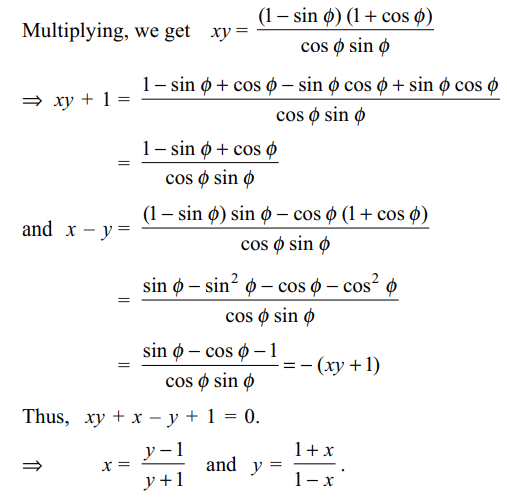
2. If tan \[x=2b/\left(a-c\right)\left(a\neq c\right),y=a\cos^{2}x+2b \sin x\cos x+c\sin^{2}x\]
and \[z=a\sin^{2}x-2b \sin x\cos x+c\cos^{2}x\]
then
a) y=z
b) y + z = a + c
c) y – z = a – c
d) Both b and c
Explanation: Adding the expression for y and z, we get
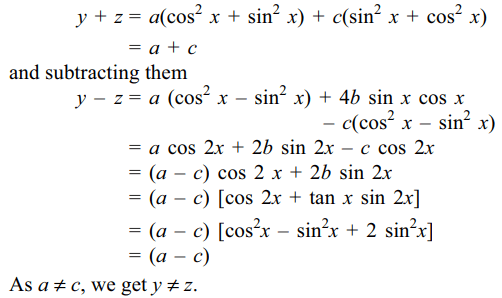
3. The values of \[\theta\] lying between 0 and
\[\pi/2\] and satisfying the equation
\[\begin{bmatrix}1+\sin ^{2}\theta & \cos^{2}\theta & 4\sin 4\theta \\\sin^{2}\theta & 1+\cos^{2}\theta & 4\sin 4\theta \\\sin^{2}\theta & \cos^{2}\theta & 1+4\sin 4\theta\end{bmatrix}=0\]
are
a) \[7\pi/24\]
b) \[5\pi/24\]
c) \[11\pi/24\]
d) Both a and c
Explanation:

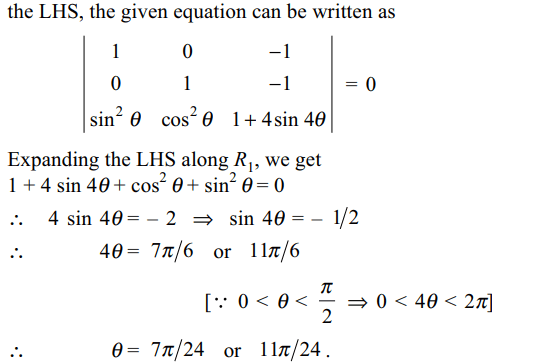
4. If \[0\leq x,y\leq180^{\circ}\] and \[\sin\left(x-y\right)=\cos\left(x+y\right)=1/2\] , then the values of x and y are given by
a) \[x=45^{\circ}, y=15^{\circ}\]
b) \[x=45^{\circ}, y=135^{\circ}\]
c) \[x=165^{\circ}, y=135^{\circ}\]
d) both a and c
Explanation:
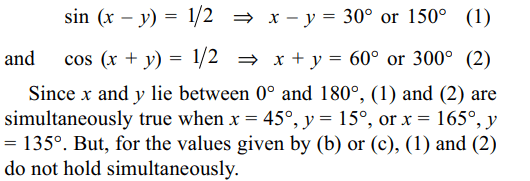
5. If \[\tan\left(x/2\right)\] = cosec x - sin x, then
\[\tan^{2}\left(x/2\right)\] is equal to
a) \[2-\sqrt{5}\]
b) \[\sqrt{5}-2\]
c) \[\left(9-4\sqrt{5}\right)\left(2+\sqrt{5}\right)\]
d) Both b and c
Explanation:


6. The value of
\[\cos y\cos\left(\frac{\pi}{2}-x\right)-\cos\left(\frac{\pi}{2}-y\right)\cos x+\sin y\cos\left(\frac{\pi}{2}-y\right)+\cos x\sin\left(\frac{\pi}{2}-4\right)\]
is zero if
a) x = 0
b) y = 0
c) x = y
d) \[x - y=\frac{3\pi}{4}\]
Explanation:
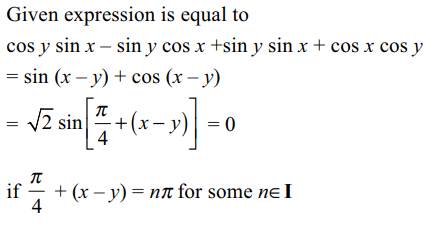

7. If \[\sin A,\cos A\] and \[\tan A\] are in G.P, then
\[\cot^{6}A-\cot^{2}A\] is equal to
a) -1
b) a
c) 1
d) none of these
Explanation:

8. If \[x_{i}>0\] for \[1\leq i\leq n\] and \[x_{1}+x_{2}+...+x_{n}=\pi\]
then the greatest value of the sum \[\sin x_{1}+\sin x_{2}+...+\sin x_{n}\]
is equal to
a) n
b) 0
c) \[n\sin\left(\frac{\pi}{n}\right)\]
d) \[\frac{n}{2}\]
Explanation:

9. If \[\sin x+\sin^{2}x+\sin^{3}x=1\] , then \[\cos^{6} x-4\cos^{4}x+8\cos^{2}x\]
is equal to
a) 0
b) 2
c) 4
d) 8
Explanation:

10. If \[\sin\alpha =p,\mid p \mid\leq 1\] , then \[\tan\frac{\alpha}{2},\cot\frac{\alpha}{2}\]
are the roots
of the equation
a) \[px^{2}-2x+p=0\]
b) \[px^{2}-x+p=0\]
c) \[px^{2}+2x+p=0\]
d) \[px^{2}-2x-p=0\]
Explanation:
